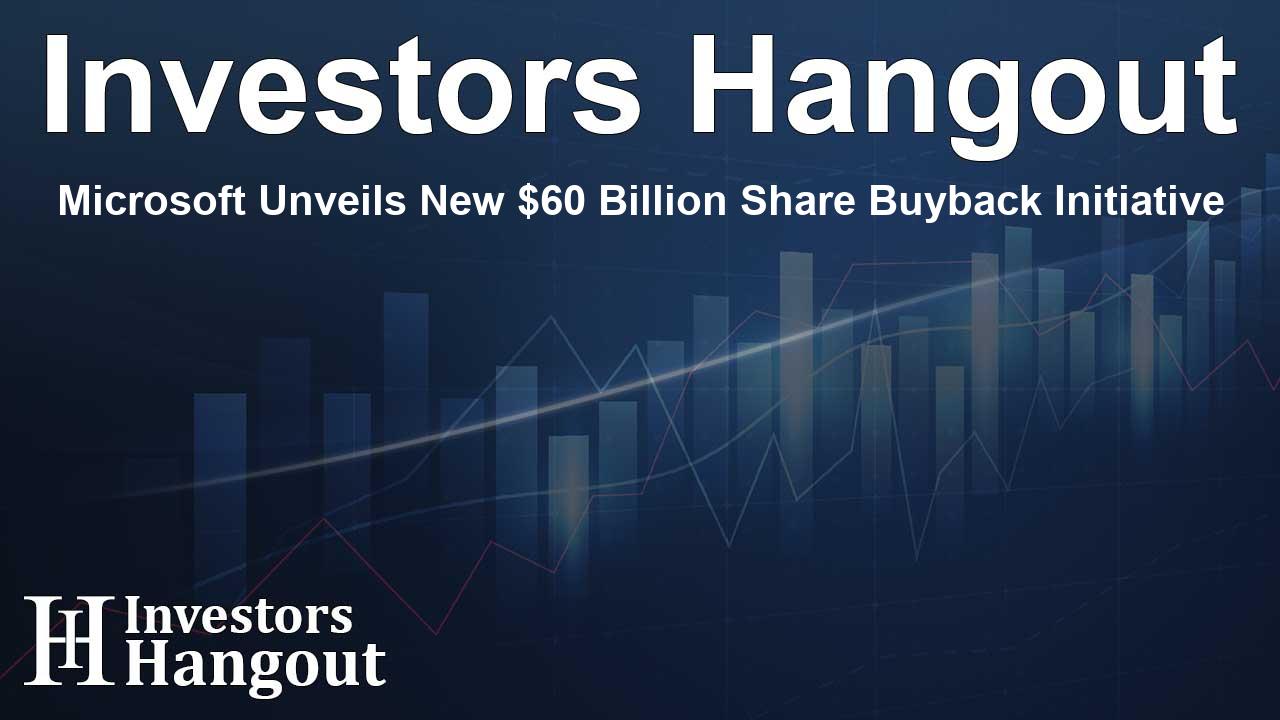Microsoft Unveils New $60 Billion Share Buyback Initiative

Microsoft's Significant Share Buyback Announcement
Microsoft recently disclosed that its board has greenlighted a major new share buyback program with an impressive cap of $60 billion. This strategic move underlines the company's ongoing commitment to providing value to its shareholders and reflects its robust financial health.
Increase in Quarterly Dividends
In addition to the buyback program, Microsoft has declared a quarterly dividend of $0.83 per share. This increase of $0.08, or 10%, over the previous quarter signals the company's strong earnings performance and dedication to returning capital to its investors.
Details on the Shareholder Meeting
Microsoft is set to convene its annual shareholders meeting on December 10. This meeting will serve as an opportunity for the board to provide updates on company performance, discuss future strategies, and address shareholder inquiries. Investors can look forward to insights on how the new buyback scheme aligns with Microsoft's broader goals.
Understanding Share Buybacks
Share buybacks occur when a company purchases its own shares from the marketplace. This process effectively reduces the number of outstanding shares, which can lead to an increase in the stock price. Such strategies are often employed in times of strong cash flow, as companies choose to invest in their own equity rather than seeking external opportunities.
The Impact on Shareholders
For shareholders, a buyback program like Microsoft's represents a direct return of capital, incentivizing investors to hold onto their shares. As dividends and buybacks often signal a company's confidence in its future earnings, this decision can also bolster investor sentiment and market confidence.
Looking Ahead: Opportunities for Growth
As Microsoft continues to grow and evolve within the competitive tech landscape, this significant capital allocation towards buybacks signals opportunities for future growth. Analysts and investors alike will be closely monitoring how these actions affect the company’s stock performance and overall market position going forward.
Frequently Asked Questions
What is a share buyback program?
A share buyback program allows a company to repurchase its own shares to increase shareholder value, reduce the number of outstanding shares, and potentially raise stock prices.
How does a dividend increase affect shareholders?
An increase in dividends rewards shareholders by providing a higher return on their investment, reflecting the company's strong financial performance.
When will Microsoft hold its next shareholders meeting?
Microsoft's annual shareholders meeting is scheduled for December 10, where updates on financial performance and future plans will be discussed.
Why do companies engage in share buybacks?
Companies engage in share buybacks to return cash to shareholders, improve financial metrics, and demonstrate confidence in their own future performance.
What does the increase in Microsoft's dividend indicate?
The increase in Microsoft's dividend indicates a strong outlook for the company's financial health and a commitment to returning value to shareholders.
About Investors Hangout
Investors Hangout is a leading online stock forum for financial discussion and learning, offering a wide range of free tools and resources. It draws in traders of all levels, who exchange market knowledge, investigate trading tactics, and keep an eye on industry developments in real time. Featuring financial articles, stock message boards, quotes, charts, company profiles, and live news updates. Through cooperative learning and a wealth of informational resources, it helps users from novices creating their first portfolios to experts honing their techniques. Join Investors Hangout today: https://investorshangout.com/
Disclaimer: The content of this article is solely for general informational purposes only; it does not represent legal, financial, or investment advice. Investors Hangout does not offer financial advice; the author is not a licensed financial advisor. Consult a qualified advisor before making any financial or investment decisions based on this article. The author's interpretation of publicly available data shapes the opinions presented here; as a result, they should not be taken as advice to purchase, sell, or hold any securities mentioned or any other investments. The author does not guarantee the accuracy, completeness, or timeliness of any material, providing it "as is." Information and market conditions may change; past performance is not indicative of future outcomes. If any of the material offered here is inaccurate, please contact us for corrections.